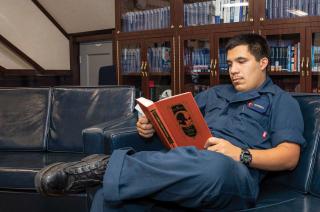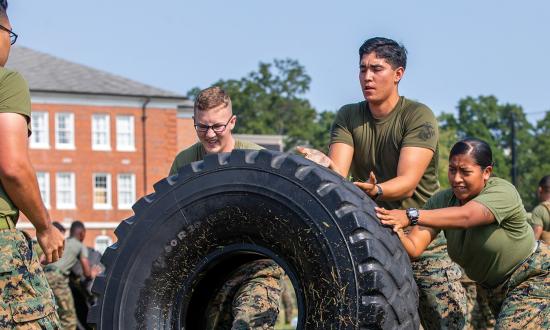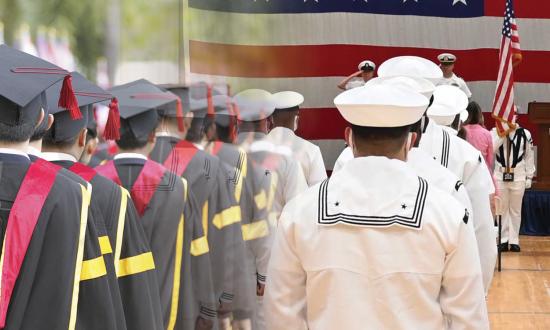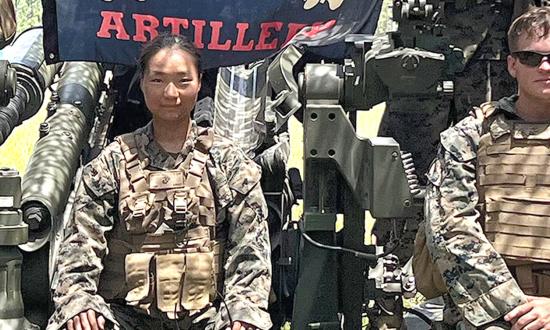In 2016, then–Chief of Naval Operations (CNO) John Richardson published A Design for Maintaining Maritime Superiority, articulating his vision for how the Navy should respond to a growing great power competition. Within it, he referenced the work of Alfred Thayer Mahan, Thucydides, Carl von Clausewitz, Sun Tzu, Mao, and Sir Julian Corbett.1 Included among these literary giants was a relative newcomer: Dr. Steven Spear.
In his book, The High-Velocity Edge, Dr. Spear showcased examples of “organizations capable of unmatchable learning and adaptation.”2 Having made the CNO’s reading list in 2015, Dr. Spear’s influence quickly became apparent in other areas. He was invited to speak at the U.S. Naval War College in 2016, and one of the four lines of effort captured in Design for Maintaining Maritime Superiority was named “Achieve High Velocity Learning at Every Level.”3
It is important to note that The High-Velocity Edge, a book that had a visible impact on the Navy, was published in May 2010, nearly five years before the title reached the CNO’s reading list. In the return of a great power competition, can we afford to wait five years to advertise literature capable of equipping us with a sustained advantage in learning?
The CNO’s Reading List
Released on 23 February 2021, CNO Admiral Michael Gilday’s Professional Reading Program had the motto “Read Well to Lead Well.” The 53-title list was separated into four sections (Readiness, Capabilities, Capacity, and Sailors) and further codified into three tiers of complexity (Foundational, Advanced, and Capstone).4 On 5 May 2021, the program dropped to just 12 books and shed the classification system from just several months earlier. CNO Gilday’s move to update the reading list at this frequency (from yearly to just several months) provides opportunities for service members who want to learn from new and influential literature at a greater speed.
Using a professional reading list to encourage self-guided learning in the Navy is not new. In fact, it has been one of three methods to “progress down the path” in all three versions of the Navy Leader Development Framework released over the past several years.5 Coupling the existing programs more closely to self-guided development could yield substantial momentum.
For example, 2012’s NavAdmin 309/12 restructured the Navy’s professional reading program, making it more accessible with the inclusion of free e-books through an Overdrive account online.6 The program has since matured, with a projected upgrade from Overdrive to Libby in late 2023. However, the platform is not without its flaws. Low inventory can lead to wait times upward of six months for certain books.
Curating Reading Lists
The NavAdmin restructure, which removed rank-based recommendations, missed a chance for guided improvement. Some small steps have been taken to remedy this for the enlisted ranks by applying reading lists to rating and pay grade–specific learning and development roadmaps (LaDRs). Unfortunately, many LaDR reading lists only employ generic advancement exam bibliographies as their recommended reading list. A system tailored to recommend books relevant to specific job roles, situations, and seniority would better guide service members.
For example, The First 90 Days by Michael D. Watkins can assist readers in preparing for new roles and would serve a junior officer reporting to a new command.7 Similarly, Rear Admiral Robert O. Wray Jr’s Saltwater Leadership, written specifically for junior officers during their first tour as a division officer, would greatly aid young leaders undergoing that journey.8
When addressing Fragmentary Order 01/2019 Admiral Gilday wrote, “Our toughest near-term challenge is reversing the trend of delivering only 40 percent of our ships from maintenance on time.”9 Curating books for command leadership of warships during shipyard availabilities, such as Scrum by Jeff Sutherland, or delving into the Project Management Institute’s project management professional (PMP) certifications, can markedly reduce lost days of productivity. Scrum advocates using agile techniques and unique group dynamics instead of the more traditional project management philosophy embodied in a PMP certification.10 Along that line, Todd Henry’s Herding Tigers, paired with The High-Velocity Edge, could help reduce the overwhelming amount of “required meetings” during maintenance availabilities, by teaching service members to assess each meeting for duration, relevance, and attendance.11
Command leadership, when challenged with investigating mistakes, could gain much from understanding the dangers of hindsight during an investigation highlighted in Sidney Dekker’s “New View” approach to causal analysis in The Field Guide to Understanding ‘Human Error.’12
Philosophical works can be leveraged to fortify mental toughness. The Enchiridion by Epictetus, writings by Immanuel Kant, and Socratic dialogues by Plato—all classified as “hard-core philosophy” in an article by Vice Admiral James B. Stockdale—could be especially useful in creating a more resilient and capable fleet.13
Reading for Great Power Competition
With an unlimited amount of literature available, it is imperative to improve the availability of relevant books, expand the visibility of programs to access them, and better curate existing reading lists to maximize self-guided study for service members. As Geoffrey F. Gresh described in his book To Rule Eurasia’s Waves:
The great power maritime competition is not likely to abate anytime soon. In fact, it is only likely to become more contentious and fraught as these competing nations place more emphasis on the importance of sustaining a blue-water naval presence beyond their respective regional seas.14
As the future of rising navalism is certain and the great power competition in which we must “compete, deter, and win today” is upon us, the study of literature cannot be stagnant.15
1. ADM John Richardson, USN, “Strategic Environment,” A Design for Maintaining Maritime Superiority, U.S. Navy Office of Information, January 2016.
2. Steven Spear, The High-Velocity Edge: How Market Leaders Leverage Operational Excellence to Beat the Competition (New York: The McGraw-Hill Companies, 2010).
3. ADM John Richardson, USN, “Four Lines of Effort,” A Design for Maintaining Maritime Superiority, U.S. Navy Office of Information, 2016.
4. ADM Michael Gilday, USN, “CNO PRP,” CNO Professional Reading Program, U.S. Navy Office of Information, 23 February 2021.
5. ADM John Richardson, USN, “Three Methods to Progress Down the Path,” Navy Leader Development Framework version 3.0, U.S. Navy Office of Information, 2019.
6. ADM Jonathan Greenert, USN, “Launch of Chief of Naval Operations Professional Reading Program,” NavAdmin 309/12, 2012.
7. Michael Watkins, The First 90 Days: Proven Strategies for Getting Up to Speed Faster and Smarter, Updated and Expanded (New York: Harvard Business Review Press, 2013).
8. RADM Robert Wray Jr, USN, Saltwater Leadership: A Primer on Leadership for the Junior Sea-Service Officer (Annapolis, MD: Naval Institute Press, 2013).
9. ADM Michael Gilday, USN, “Warfighting,” FRAGO 01/2019: A Design for Maintaining Maritime Superiority, U.S. Navy Office of Information, December 2019.
10. Jeff Sutherland and J. J. Sutherland, Scrum: The Art of Doing Twice the Work in Half the Time (New York: Crown Business, 2014).
11. Todd Henry, Herding Tigers: Be the Leader That Creative People Need (United Kingdom: Portfolio, 2018).
12. Sidney Dekker, The Field Guide to Understanding ‘Human Error,’ 3rd edition (New York: Ashgate Publishing Company), 2017.
13. VADM James Stockdale, USN, “Leadership Forum: Moral Leadership,” U.S. Naval Institute Proceedings 106, no. 9 (September 1980).
14. Geoffrey F. Gresh, “Heightened Maritime Competition and Shifting Seas,” To Rule Eurasia’s Waves: The Next Great Power Competition at Sea (New Haven, CT: Yale University Press, 2020), 286.
15. ADM Michael Gilday, USN, “Our Response: Deploy Forward to Defend America and Our Allies and Protect Freedom of the Seas,” CNO Navigation Plan, U.S. Navy Office of Information, 2021.







